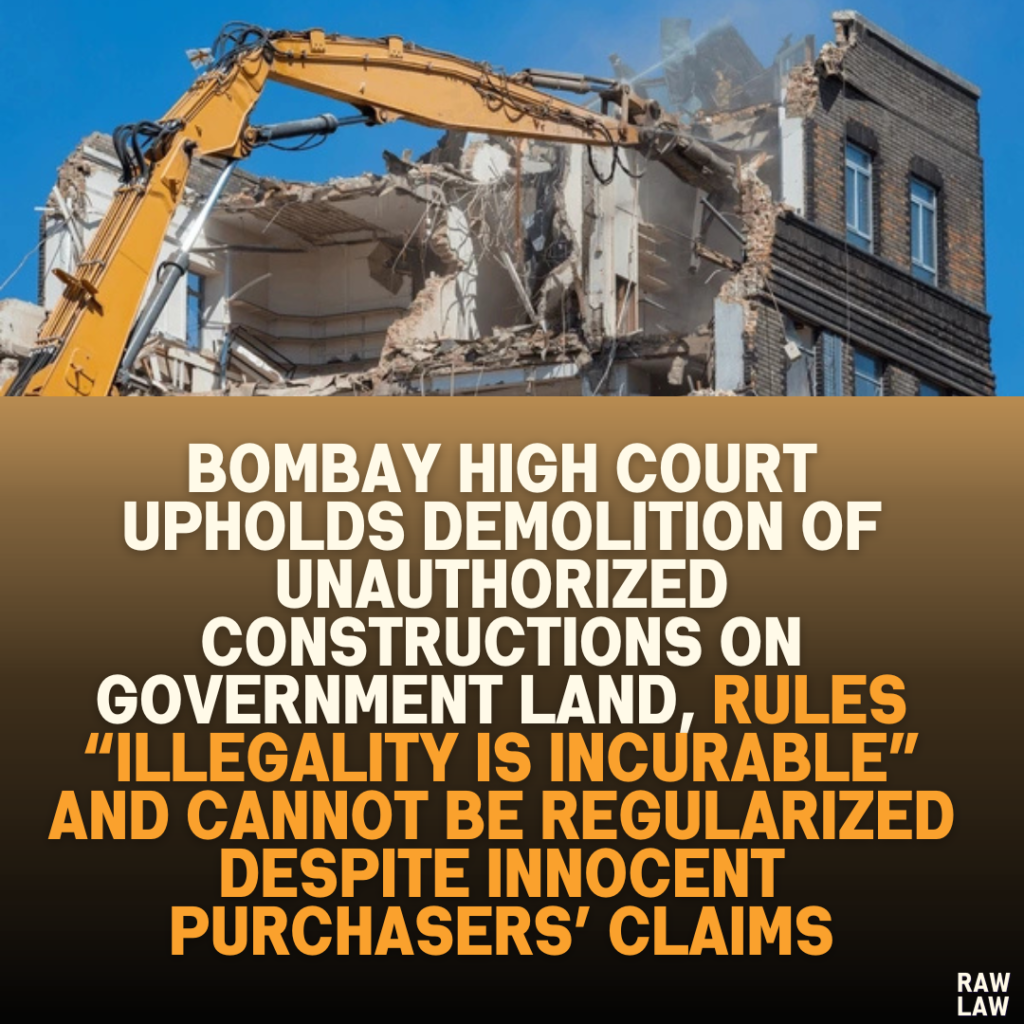Court’s Decision
The Bombay High Court dismissed a writ petition filed by flat owners challenging the demolition of their apartments in the Saidham Apartments complex, Thane. The court held that the constructions were illegal and unauthorized, making them incurable under law. It affirmed the earlier judgment of July 25, 2024, which had ordered the demolition and directed the developer to pay ₹8 crores as compensation for flat purchasers. The court emphasized that purchasers’ rights flowed from the illegality of the construction and their remedies lay solely against the developers.
Facts
- Background: The Saidham Apartments complex consisted of five buildings constructed without authorization on government land in Thane district.
- Earlier Judgment: On July 25, 2024, the Bombay High Court declared the buildings illegal and unauthorized, ordering their demolition. The judgment also directed the developer to deposit ₹8 crores for pro rata distribution among flat purchasers as compensation.
- Implementation Notices: On January 6, 2025, the Tahsildar issued notices to enforce the demolition order.
- Petitioners’ Claims: The petitioners, claiming to be innocent purchasers, filed the writ petition challenging the notices and seeking regularization of their flats under Section 52A of the Maharashtra Regional Town Planning Act (MRTP Act). They argued that they were denied a fair hearing and that no survey was conducted to confirm the alleged encroachment.
Issues
- Validity of the Demolition Orders: Were the demolition orders legally justified, given the nature of the constructions?
- Rights of Innocent Purchasers: Could the petitioners, as bona fide third-party purchasers, seek regularization of their flats?
- Principles of Natural Justice: Did the absence of the petitioners in earlier proceedings violate the principles of natural justice?
Petitioner’s Arguments
- Natural Justice Violations: The petitioners argued they were not made parties to the earlier proceedings, and thus, their right to be heard was violated.
- Survey Requirement: They contended that no proper survey was conducted to determine whether the constructions encroached on government land, making the demolition orders premature.
- Regularization Under MRTP Act: The petitioners claimed their flats could be regularized under Section 52A of the MRTP Act as they were innocent purchasers unaware of the illegality.
Respondent’s Arguments
- Illegal Constructions: The respondents emphasized that the constructions were unauthorized and on government land, making regularization legally impossible.
- Finality of Judgment: The July 2024 judgment, which ordered demolition, had attained finality after the Supreme Court dismissed an appeal (SLP) in December 2024.
- Remedies Against Developers: The respondents argued that the petitioners’ claims, if any, should be pursued against the developer and not against the authorities enforcing the law.
Analysis of the Law
- Illegality is Incurable: The court reaffirmed that constructions on government land or unauthorized constructions could not be legitimized. It relied on the following precedents:
- Priyanka Estates International v. State of Assam (2004): Held that purchasers of illegal constructions cannot claim equities or protection under law.
- Esha Ekta Apartments v. Municipal Corporation of Mumbai (2012): Declared that unauthorized constructions must be demolished regardless of the innocence of the purchasers.
- K. Ramdas Shenoy v. Town Municipal Council, Udipi (1976): Established that illegality in construction cannot be cured and must be addressed strictly.
- Supreme Court Guidance:
- Rajendra Kumar Barjatya v. U.P. Avas Evam Vikas Parishad (2024): The Supreme Court emphasized strict adherence to urban planning laws, stating that unauthorized constructions must be demolished without leniency.
- MRTP Act Analysis: The court found that Section 52A of the MRTP Act did not apply as it does not permit regularization of constructions on government land or unauthorized buildings that fundamentally violate planning laws.
Precedent Analysis
The court reiterated the principles laid down by the Supreme Court regarding unauthorized constructions:
- Unauthorized constructions threaten urban planning and environmental sustainability.
- Courts must adopt a strict approach to curb illegal constructions, regardless of the purchasers’ innocence.
- Regularization is an exception, not a rule, and can only be considered in extraordinary circumstances.
Court’s Reasoning
- No Basis for Regularization: The court rejected the petitioners’ application for regularization, noting that it was filed belatedly after arguments were concluded. Additionally, the application was not submitted to the appropriate authority and lacked merit.
- Finality of Prior Judgment: The court emphasized that the July 2024 judgment was final and binding, as the Supreme Court had dismissed an appeal against it.
- Purchasers’ Rights Flow from Illegality: The court held that the petitioners’ rights, if any, were against the developers for compensation and not against the authorities enforcing the demolition.
Conclusion
The court dismissed the petition, holding that the constructions were illegal and could not be regularized. However, it clarified that the petitioners were free to pursue compensation claims against the developer.
Implications
The judgment serves as a strong reminder of the judiciary’s commitment to upholding urban planning laws. It discourages unauthorized constructions by emphasizing that they cannot be legitimized, even when innocent purchasers are involved. The decision underscores the importance of vigilance and due diligence by homebuyers and the enforcement of accountability among developers.



